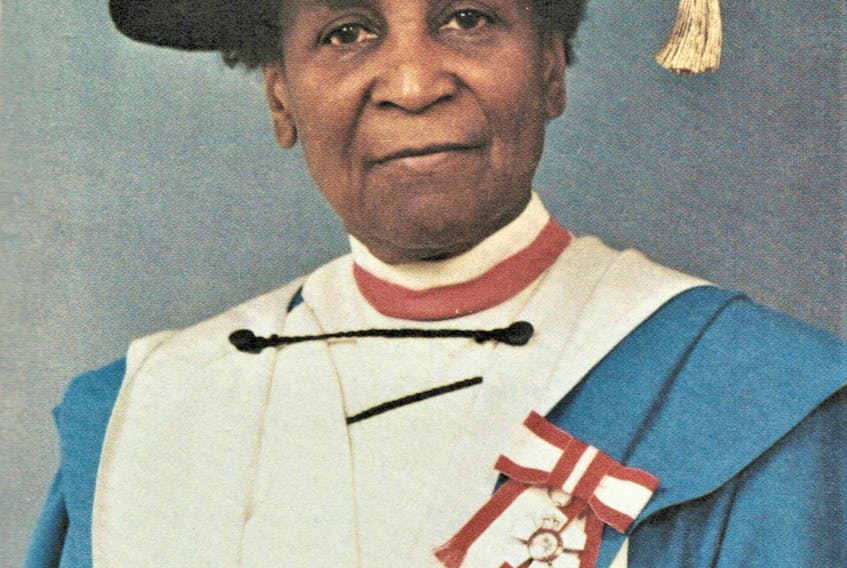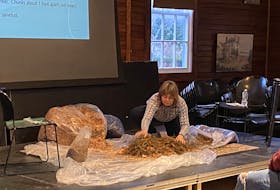The famous Viola Desmond story is well documented and publicized as a turning point in Canadian racial equality history.
In 1946, Ms. Desmond was charged at a New Glasgow movie theater for sitting in the white-only section. However, five years before this terrible travesty on Dec. 29, 1941, African Nova Scotians-born Carrie (Prevoe) Best and her 16-year-old son Calbert Best met the very same discrimination at the very same theater. And in 1946, Carrie Best would encourage, support and advise Viola Desmond’s challenge of racial discrimination.
In the year 2000, I had the honour and privilege of meeting Dr. Carrie Best, (OC, LLD, human rights activist, author, journalist, publisher and broadcaster) at her South Fredrick Street home in New Glasgow. Dr. Best invited me into talk about African Nova Scotian history and its importance in Pictou County. As we sat in her front living room sipping tea and munching on cookies, she immediately inquired, “who I was, where did I come from and why my interest in black history”? Of course, I gave Dr. Best a very brief personal bio of my roots and a quick answer of my love of “all history” and thanked my parents guiding words “to respect all peoples, no matter of race or colour.”
It was then, Dr. Best began an oratory of her life and racial equality struggles and challenges. At times the conversation was humorous, but much discussion centered on the seriousness of a world of segregation, discrimination and ridicule. Carrie’s mother Georgina (Ashe), who could not either read or write laid down the foundation of fairness and dignity of their African roots. She urged “her children to resist the racist culture that labelled them inferior.” Her parents taught their “children and grandchildren to take pride in their heritage and seek information about the true role of African Canadians in our history and defiantly “stay in school.”
These words of wisdom would have extreme influence on daughter Carrie and grandson Calbert and benefit all of Canada in years to come. The Best’s racial incident of 1941 is seldom mentioned and challenged the very soul of the everyday beliefs passed down by this African Pictou County family.
Racial segregation in public places was very common throughout United States and Canada in the 1930s and 1940s. In 1941 the Roseland Theater changed its seating policy after “some of the white patrons began to complain that they felt African-Canadian movie-goers should be asked to sit separately in the balcony area upstairs.” The staff was directed to carry out the order and after a “group of local “African-Canadian high school girls refused to comply, they were forcibly removed.” Carrie Best acted immediately. She began her fight for racial equality by personally raising the discrimination issue with the Roseland Theater by sending a letter to owner N.W. Mason.
“Dear Mr. Mason:
I sincerely trust that this is the last time that I shall be forced to undergo the humiliating and undemocratic treatment that I have been forced to undergo from your employees at the Roseland Theatre.
It should not be necessary for me to remind them that I am a citizen and taxpayer in the town and as such have the right under British law to sit in any public place I wish to while I enter and exit in a clean, orderly manner.
I have spent the entire afternoon conducting a personal Gallup poll to see if this rule is the carry-over from the faraway days of slavery or if this is the rule of the board of directors and shareholders of the Roseland Theatre Company. Scores of respected citizens were amazed to believe that such Jim Crow tactics are practiced on decent law-abiding citizens and when the time comes have said they will not hesitate to speak against it.
Today I speak for one family, the Bests, my husband, my son and myself. I will ask, no, I will demand to be given the same rights as the Chinese and other nationalities of the Dominion of Canada and today I speak for my family only. As I am too tired to come to the theatre tonight, I respectfully request you, Sir, to instruct your employees to sell me the ticket I wish when next I come to the theatre or I shall make public every statement made to me by you and your help: of negroes being dirty, smelly, etc., and of you taking it upon yourself to evict high-school girls of irreproachable character from your office. Please get this straight, Mr. Mason. If respectable coloured people are cowardly enough to put up with such treatment, they are welcome. I speak today for no family but my own and if you wish a public controversy both pro and con as to whether you have the power of a dictator to decide in a British town who is a citizen and who isn’t, you can have it. If my words are clear and strong, I wish you could have heard some of the citizens who do not believe such a thing is possible in times like these. The statement of your employee to me that no coloured person can sit downstairs in the Capitol Theatre in Halifax is a lie of the first order as I have and always do sit there, and I am sure the public will be interested to hear all this. I am coming to the theatre Monday”
Mrs. Best
On Monday afternoon Dec. 29, Carrie Best and son Calbert arrived at the Roseland Theater and “placed two quarters on the ticket-sellers counter and asked for two downstairs seats.” Carrie and Calbert entered the downstairs section and what transpired next was the same treatment that Viola Desmond would receive four years later. Carrie and son were forcibly removed by police. During this time period “there were no Canadian statutes expressly prohibiting racial segregation in public facilities.
Carrie Best hired a local lawyer and charged N.W. Mason with discrimination. The short Supreme Court trial was a farce. Carrie Best lost the case and she had to pay the Roseland Theater owner $156.07. “The jury “did not find the theater people acted improperly.” This racial incident was a life-changing moment for Carrie Best and her son Calbert. Both embarked on careers that would change Canadian history and help establish and improve racial equality, understanding and respect for all our societies benefit.
Pictou County has had a settled African descendant presence since the 1700s. Racial equality has been a struggle and challenge for centuries. Many actions and initiatives have been brought forward by many communities within our county to improve life for all. Recently, I had an opportunity to chat with Henderson Paris (human rights activists, politician, mentor, athletic, coach and community champion) about his thoughts about race relations in our county. He began, “this being African Heritage Month in Nova Scotia is meant for people of all cultures and walks of life to learn about the amazing contributions and achievements made by people of African descent. I truly believe that our Pictou County communities, have grasped the baton of diversity and inclusion and are determined and committed to make continued progressive strides. Also, I feel that the communities realize we all need to live, work, play, socialize and yes even pray together.”
These sentiments were also agreed by the Town of New Glasgow “Celebrating African Heritage Month will recognize and applaud, pride of place for people of African descent. We will continuously advance community engagement and participation for peoples and nationalities.” New Glasgow has extensively developed initiatives and programs that are respectful, celebratory and inclusive.
We would like to end with a quote from Henderson Paris: “Challenges regarding race will undoubtedly happen. However, we as a combined and resilient society of all cultures and nationalities must face it head on. We need to confront this when it happens with the same resilient strength, hopes, dreams, determination and perseverance of those that came before and those that are coming after us.”
Historical research
I was unable to identify with Topsy Carrie M. Best’s Struggle Against Racial Segregation in Nova Scotia in 1941, Constance Backhouse
The Lonesome Road Dr. Carrie Best
“They stood up for their rights-for sitting down” – Quote from Zocala Poets
Pictou Antigonish Regional Library
The Canadian Encyclopedia
The Workers’ History Museum, Ottawa
The Clarion Newspaper Dec. 31, 1946
Eastern Chronicle, May 5, 1942
Ms. Berma Marshall
Mr. Henderson Paris
Mayor Nancy Dicks
Ms. Geralyn MacDonald
John Ashton is a 34-year self-employed historical author, graphic and visual artist and operates the Nova Scotia registered business, Ashton Creative Design in Bridgeville, Pictou County. He may be reached at [email protected].









